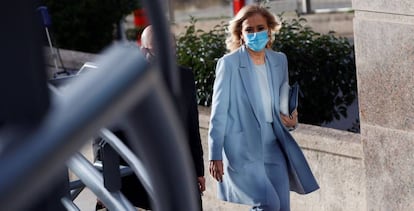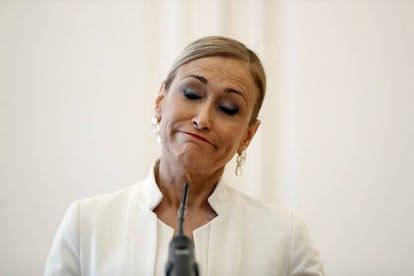Ex-Madrid premier Cristina Cifuentes acquitted of wrongdoing in master’s degree scandal
The regional High Court found no conclusive evidence that the former Popular Party politician ordered the forgery of university documents

Former Madrid regional premier Cristina Cifuentes has been acquitted of wrongdoing in a case involving forged university documents.
The regional High Court has found no conclusive evidence that Cifuentes, who served as premier between 2015 and 2018 with the conservative Popular Party (PP), ordered the forgery of a document certifying that she had completed and defended a final project for a master’s degree in public regional law at King Juan Carlos University.
However, the three-judge panel has sentenced María Teresa Feito, a former advisor to the regional government, to three years in prison, while Cecilia Rosado, who admitted at the trial that she personally forged the document, has been given a prison term of one year and six months.
The court also found it “inexplicable” that Cifuentes can still hold that she defended her thesis, and described her degree as “plagued by serious irregularities”
Cifuentes’ political career ended following revelations that she had never completed the coursework for the degree, and that she might not have defended her final thesis at all. When an online newspaper broke the story in March 2018, Cifuentes produced a university document certifying that a three-member panel had heard her dissertation on July 2, 2012.
But two of those individuals later denied being there or signing any documents. They and the director of the university’s Public Law Institute (IDP) denounced pressure from top university officials to produce paperwork that would back up Cifuentes’ claim about completing her degree.
That scandal was followed by a leaked video showing Cifuentes apparently shoplifting and getting caught by security personnel at a supermarket in 2011. The embattled premier resigned in April 2018.

In a 19-page decision that may be appealed, the court has ended another chapter in a long-running legal process that originally focused on a scheme devised by IDP director Enrique Álvarez Conde to award university diplomas to politicians. Investigators also looked at a degree from the same center obtained by PP president Pablo Casado, although the Supreme Court refused to accept the case.
The court concluded that there is no proof that Cifuentes played any role in “encouraging, suggesting or pressuring to obtain” the forged document, which she once exhibited in public to prove that she had obtained her qualifications lawfully.
“The fact of publicly exhibiting the copy of a document she received from the [university] rector is nothing more than circumstantial evidence not corroborated by any other evidence,” reads the ruling. The judges do say that Cifuentes’ testimony in court evidenced “a series of inconsistencies, relevant and incompatible with the regular actions of a graduate student.”
Cifuentes herself has admitted that she never went to class and was not in touch with any instructor
The court also found it “inexplicable” that Cifuentes can still hold that she defended her thesis, and described her degree as “plagued by serious irregularities,” including the fact that a university employee who was also a colleague of Cifuentes’ sister accessed the university’s computer files “despite lacking the authority to do so” and altered the former politician’s final grade.
Cifuentes herself has admitted that she never went to class and was not in touch with any instructor. Yet she passed every subject on the strength of papers and projects that have never turned up, and which she allegedly hand-delivered to the now-deceased Álvarez Conde, considered the mastermind behind the scheme.
Prosecutors had argued that when the scandal broke, Cifuentes sent government advisor Feito to the university and, through her, pressured Rosado into fabricating the document. But the court believes that this theory has not been sufficiently proven. The defense lawyer, José Antonio Choclán, argued that since Álvarez Conde had forged documents for other students, he could well have done the same for Cifuentes without her playing any role in it. “Everything was cooked up within the university,” claimed Choclán.
The court ends the chain of accountability at the government advisor, Feito, who pressured Rosado “in an insistent and overwhelming way” into creating the fake document, even telling her the date of completion that should show up on the diploma, July 2, 2012.
English version by Susana Urra.
Tu suscripción se está usando en otro dispositivo
¿Quieres añadir otro usuario a tu suscripción?
Si continúas leyendo en este dispositivo, no se podrá leer en el otro.
FlechaTu suscripción se está usando en otro dispositivo y solo puedes acceder a EL PAÍS desde un dispositivo a la vez.
Si quieres compartir tu cuenta, cambia tu suscripción a la modalidad Premium, así podrás añadir otro usuario. Cada uno accederá con su propia cuenta de email, lo que os permitirá personalizar vuestra experiencia en EL PAÍS.
¿Tienes una suscripción de empresa? Accede aquí para contratar más cuentas.
En el caso de no saber quién está usando tu cuenta, te recomendamos cambiar tu contraseña aquí.
Si decides continuar compartiendo tu cuenta, este mensaje se mostrará en tu dispositivo y en el de la otra persona que está usando tu cuenta de forma indefinida, afectando a tu experiencia de lectura. Puedes consultar aquí los términos y condiciones de la suscripción digital.








































